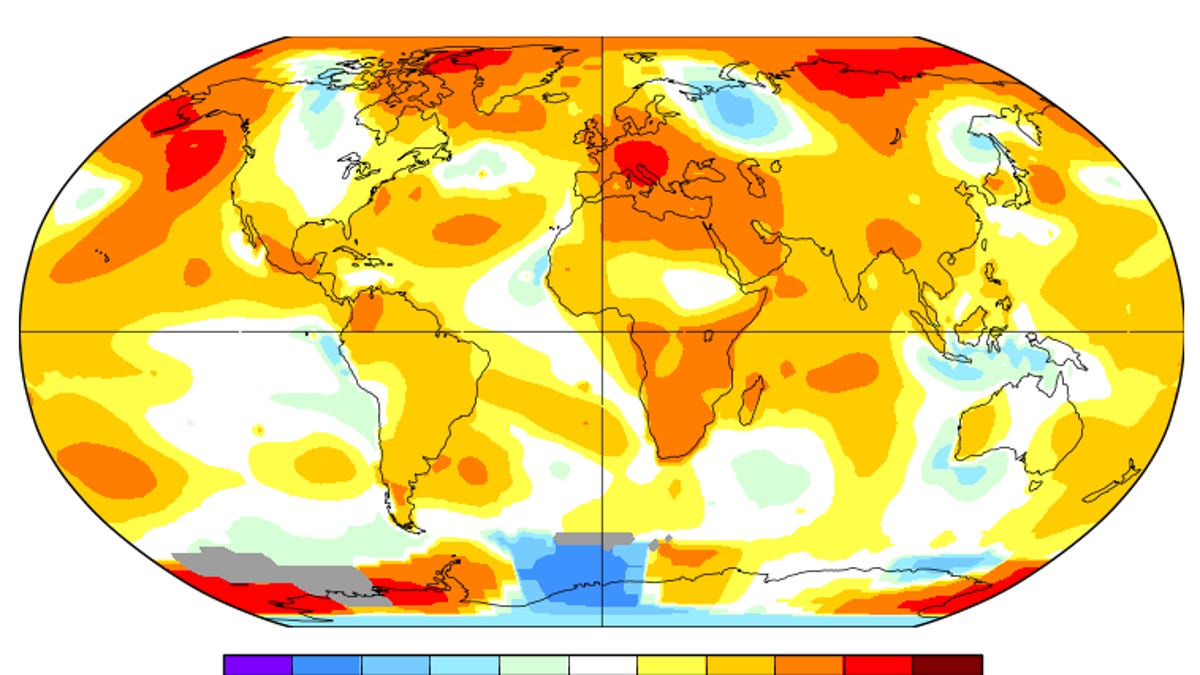Earth may be in its hottest five-year period ever recorded
Scientists sound the alarm ahead of the UN Climate Action Summit.

Mean surface temperature change during the North American summer in 2019 compared to 1981-2010.
We've just sweltered through the the hottest July ever recorded, complete with extreme heatwaves, and now a landmark report by a conglomerate of climate research organizations demonstrates the planet is warming like never before. The new assessment, commissioned by the United Nations ahead of the Climate Action Summit on Monday, shows the average temperature of the planet between 2015 and 2019 is on track to be the hottest five-year period ever recorded.
Released by the Climate Action Summit's Science Advisory group, the far-reaching United In Science report brings together the latest data on the climate crisis from eight research organizations. Its chief message is that the Earth's surface is getting warmer and we are slipping further away from halting the dangers. Estimates suggest that the period between 2015 and 2019 will be 1.1 degrees Celsius higher than preindustrial levels and up to 0.28 degree Celsius higher than the period from 2011 to 2015.
It also paints a stark picture of record-high fossil fuel carbon dioxide emissions and an acceleration in sea level rise and acidity. More broadly, it suggests that current global policies to halt climate change are simply not enough to meet the goals set out in the Paris Agreement by the United Nations Framework Convention on Climate Change.
The chief aim of the agreement, signed in 2016 by 195 countries, is to limit a global temperature rise to less than 2 degrees Celsius by 2100.
To achieve this, greenhouse gas emissions would have to peak by 2020 and decline rapidly thereafter. However, today's report suggests that emissions are unlikely to peak by 2030 -- 10 years after that deadline. While many nations have committed to reducing greenhouse gas emissions since the agreement was signed, the targets aren't enough and would see temperatures rise up to 3 degrees Celsius by 2100.
For the temperature increase to remain below 2 degrees Celsius, the United Nations Environment Programme suggests "ambition needs to be roughly tripled" and greenhouse gas emissions the world over would need to be slashed. An even lower target, to keep warming to below 1.5 degrees, would require a fivefold increase.
The UN urged in a previous report that "unprecedented" action would be needed to mitigate the effects of climate change and reach the targets set out in the Paris Agreement. The latest look at the data doesn't rule out meeting the lower goal of 1.5 degrees of warming but again stresses the need for rapid, unprecedented change.
"This new assessment is another sobering reminder of the critical state of the climate crisis and a call on governments, businesses and civic society to act more determined and aggressively in reducing greenhouse gases emissions," said Pep Canadell, a contributing author on the report and climate scientist with Australia's Commonwealth Scientific and Industrial Research Organisation.
In an effort to be heard by policymakers, climate strike rallies took place around the globe Friday, with millions taking to the streets in over 160 countries to demand action. The UN has called on leaders to attend the Climate Action Summit, which takes place on Monday.

